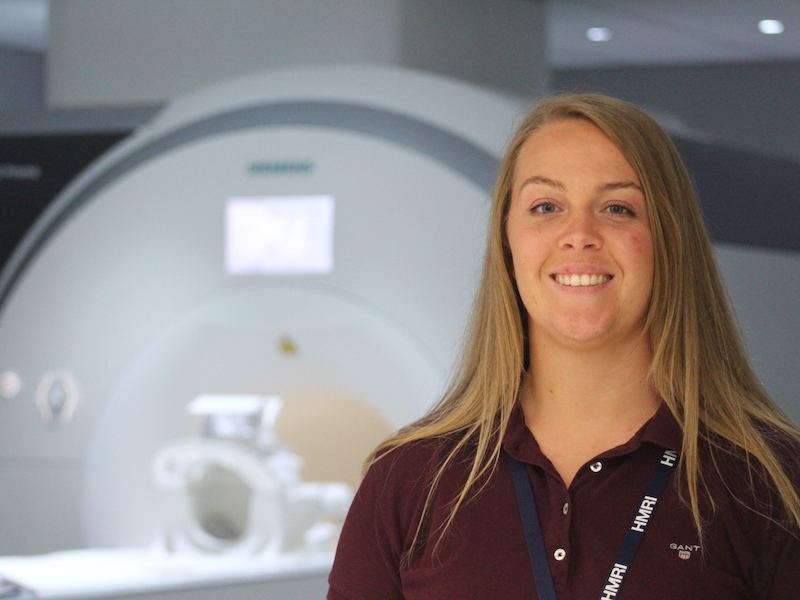Mind over Muscle
Dr Sarah Valkenborghs
Working alongside clinicians, psychologists and schoolteachers, Dr Sarah Valkenborghs aims to provide the evidence needed to see people supported to move and be active as part of the prevention, treatment and management of brain and mental health conditions.

Specifically, Sarah wants to elucidate the physiological effects of exercise that are beneficial for our brain and mental health – for people with and without disease. Sarah has conducted multiple studies exploring the effects of movement and exercise on mental health, stress, fatigue, and cognition in a range of populations including senior high school students, pregnant women, infants and toddlers, men with depression, stroke, and multiple sclerosis.
“Improving the wellbeing of our communities is of utmost real-world importance considering mental health and neurodevelopmental disorders make up the largest non-fatal disease burden for young Australians, with 8% of government health expenditure spent on mental health services.” Sarah explains.
Charting a course towards wellbeing
To have the most impact Sarah’s current research targets sensitive periods of development which set a person's trajectory for lifelong health and well-being. For these reasons and more, Sarah’s current research focuses on brain development of babies in the womb, children, and adolescents. As part of a collaboration with Professor Craig Pennell and the NEW1000 pregnancy cohort study, one of Sarah’s current studies is investigating if physical activity during pregnancy impacts a baby’s brain development.
“Once upon a time, we had no idea about how or which lifestyle behaviours during pregnancy impacted baby brain development. Nowadays, everyone is familiar with the consequences of smoking and alcohol consumption, as well as the benefits of good nutrition and folic acid. Strangely we still don’t know much about how movement and exercise impact baby brain development!”
Shining a spotlight on the brain
To answer complex questions like this, as a physiologist, Sarah uses high-tech equipment such as multi-modal MRI (Magnetic Resonance Imaging), alongside an array of other techniques.
“For me, MRI is integral to the work I do. The beauty of MRI is that it is non-invasive,” Sarah says. “For a patient or research participant it’s an easy process – you can just lie there, the radiographer zooms in on the area of the brain the researcher is interested in and uses the scanner to capture the images or the data the researcher needs. Many of the participants we work with say it’s one of the easiest appointments they have.”
MRI not only gives Sarah cool images of the brain, but it also provides exciting insights into concentrations of metabolites within different parts of the brain. This enables Sarah’s team to understand how movement and exercise impact a person’s brain at a basic molecular and cellular level, as well as at a functional and structural level – all from just one MRI scan!
Metabolites offer exciting insights
This has proven advantageous for Sarah’s pregnancy study. With data from just one MRI scan, her team are not only measuring babies’ brain development structurally AND metabolically – they’re also measuring the metabolism of the placenta. This will help them understand if the placenta plays a role in the link between physical activity during pregnancy and baby brain development.
Research is a team sport
Due to Sarah’s expertise in exercise and MRI within the context of brain and mental health, she has collaborations with a wide array of professions such as neurologists, obstetricians, psychologists, physiotherapists, and PDHPE teachers. One project that Sarah has been working on with Professor David Lubans is demonstrating the benefits of HIIT (High Intensity Interval Training) in senior high school students. “Dave’s team is trying to produce the evidence needed that high schools should be mandated to provide senior high school students with opportunities to be physically active at school.”
To assist with this mission, Sarah is leading the MRI component of the NHMRC-funded ‘Burn 2 Learn’ cluster randomised control trial and examining how it impacts the students’ brain development during this sensitive period of development.
“So far, we’ve discovered that the HITT program enhanced metabolism of a part of the brain that is critical for cognition and mental health called the Hippocampus. We’ve also discovered that supporting students to be physically active at school has supported a normal developmental trajectory of their brains’ structurally as well. So, to us, this indicates that the status quo of school’s prioritising and maximising time spent on academic curricular content, at the expense of opportunities to be physically active such as school sport and/or PDHPE, might actually be counterproductive to their cognition, mental health and overall academic performance.”
Award-winning impact
Answering real world research questions like this with rigorous scientific studies has a lot to do with Sarah being named Early Career Researcher of the Year by The University of Newcastle in 2023. Despite only completing her PhD in 2019, many of Sarah’s research findings have already gone on to change policy and practice in a range of fields. And judging by her current pregnancy and child development research, it sounds like there’s a lot more where that came from!
The University of Newcastle acknowledges the traditional custodians of the lands within our footprint areas: Awabakal, Darkinjung, Biripai, Worimi, Wonnarua, and Eora Nations. We also pay respect to the wisdom of our Elders past and present.
